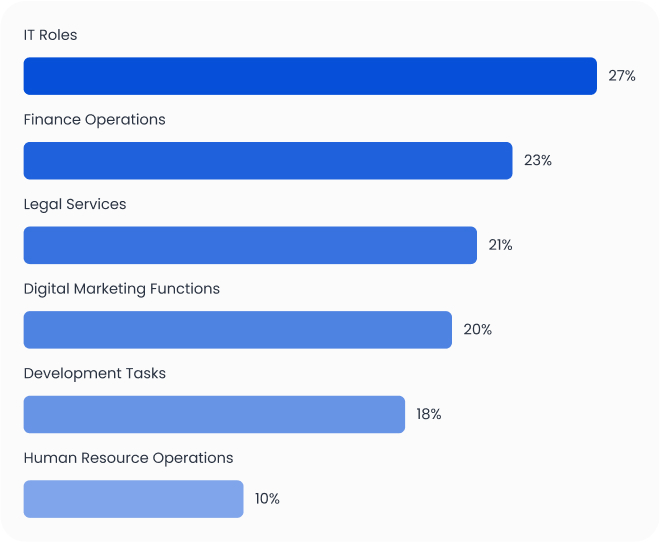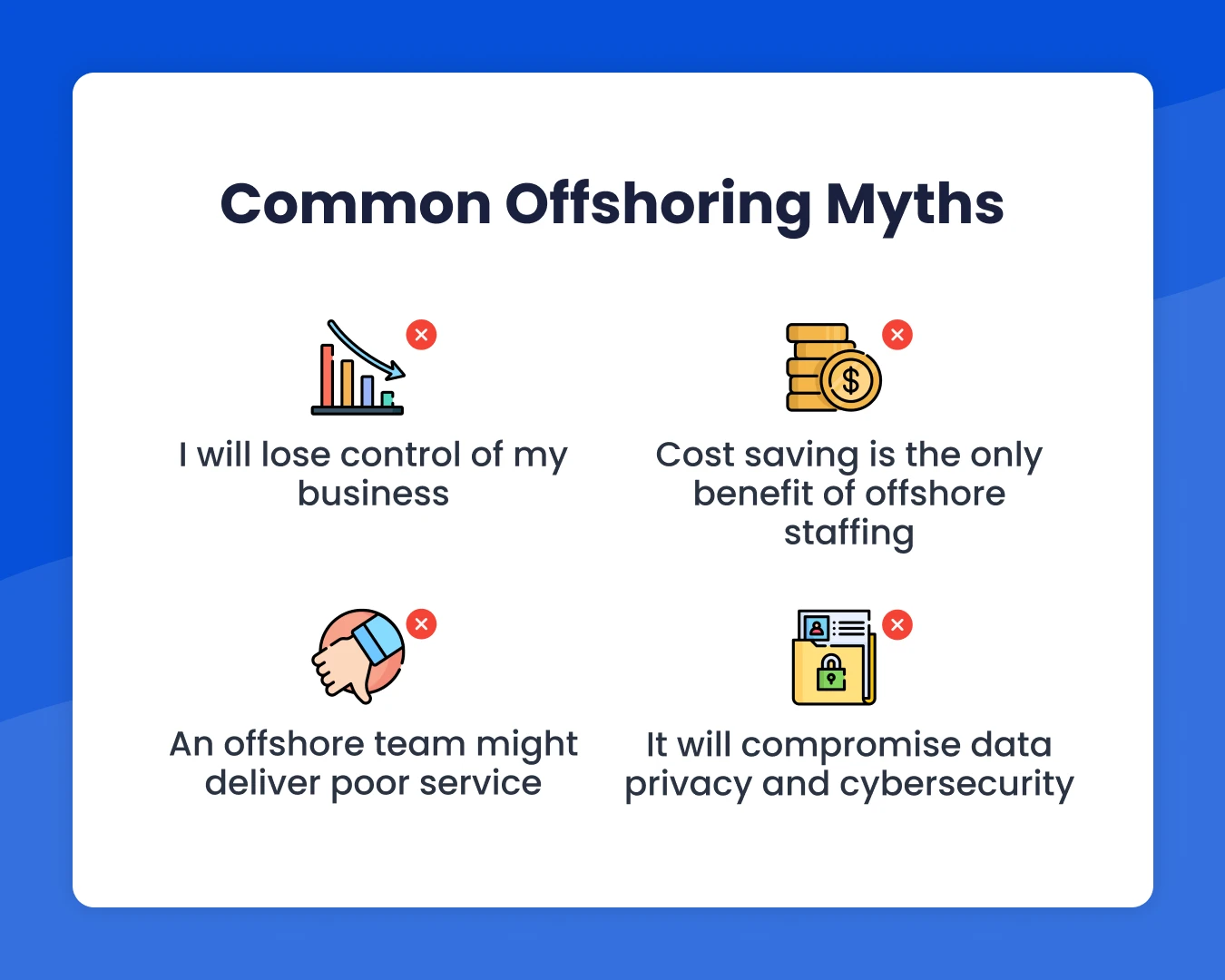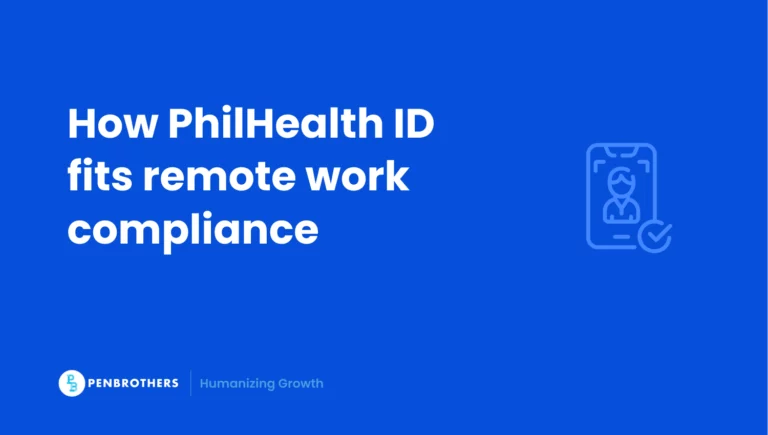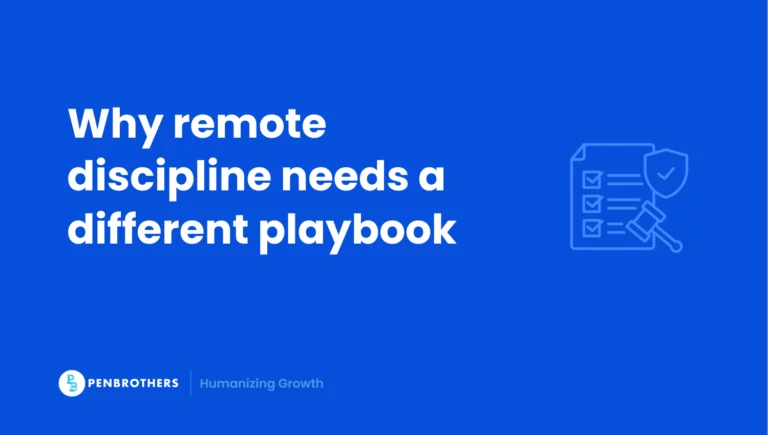Key Takeaways
- A Strategic Tool for All Businesses, Not Just Large Ones: Offshore staffing is a viable and powerful strategy for SMEs and startups, not just large corporations. The article notes that 90% of small businesses plan to outsource to streamline operations and reduce costs.
- Fears About Quality and Control are Unfounded: Common concerns about poor service quality and losing business control are largely myths. Data shows 80% of companies are satisfied with their remote teams’ performance, and with the right partner and communication tools, you can maintain full alignment and oversight.
- Benefits Extend Beyond Cost Savings: While reducing costs is a major advantage, offshore staffing is also a critical solution to the global talent shortage. It provides access to a global pool of skilled professionals and saves significant time on administrative functions like benefits and compliance.
- Communication and Security are Solvable Challenges: Concerns about communication barriers and data security are best addressed by choosing the right location and partner. The Philippines, for example, has high English proficiency that minimizes language issues, and a reputable offshore partner will have robust security protocols and compliance with international data protection laws.
If anything good came out of the two-year slowdown brought about by the pandemic, it’s the world’s adaptation of remote work in most industries. Much has been said about the staying power of off-site work post-COVID era. But even so, naysayers and skeptics doubt the benefits of working remotely with an offshore team.
Are you starting to build a team for your startup? Considering hiring people abroad and managing them remotely?
If you’re not sure if it’s the right business decision for you, keep reading. We list down the common misconceptions about offshore teams and the realities backed up by facts.
Myth 1: I will lose control of my business
With offshoring or hiring a remote team, companies have third-party workers from another country perform specific functions such as sales, IT, and accounting. Even so, having an offshore staff doesn’t mean you’ll lose control of your business. Rather, it will enable you to prioritize your core business and its profitability.
In fact, 49% of companies hire remote teams from all over the world so that they can focus on the more critical business functions.
Hiring remote workers is like having a team down the hall. With the right communications platforms in place, you won’t have to worry about being aligned on your vision and timelines.
Myth 2: An offshore team might deliver poor service

Not true. A Deloitte survey found that 80% of the participating companies were satisfied with their remote team’s performance.
Hiring a team that you don’t work with on-site might lead you to thinking that they’ll do mediocre work. But with the right offshore staffing partner, especially in the Philippines, you’ll get exceptional and hardworking talents at a fraction of the cost of onshore hiring.
The right offshoring partner gives you access to highly skilled and qualified talents for the positions you need to fill. Effective offshore partners ensure that offshore talents undergo a thorough vetting process before hiring them.
Having a performance management system in place enables consistently tracking how your remote team performs. It also lets you see which of your team members need extra training and guidance to maximize their potential. An offshore HR partner implements relevant training and development programs so that your team can learn new skills or improve existing ones.
Related article: Offshoring to the Philippines: A Viable Solution to Global Talent Challenges
Myth 3: Only large companies can build offshore teams
One of the most common misconceptions about remote teams is that they’re only accessible to big and established businesses. False!
Even small and newly launched businesses can outsource specific tasks to overseas-based workers and reap its benefits. With an offshore team, SMEs and startups with smaller budgets can cut on labor costs and reallocate their budget to other critical costs.
See also: Estimate Cost Savings from Hiring Offshore Staff with our Employee Cost Calculator!
In 2021, the Clutch Small Business had a survey revealing that 90% of small businesses planned to outsource business functions to optimize and streamline their operations. Also, most of these small businesses are keen to hire and outsource functions such as IT, finance, and legal.

Myth 4: It’s too complicated to build an offshore team
Indeed, building an overseas-based remote team can be very challenging. But with the help of an offshore staffing company, hiring the right talents can be a simple and seamless process.
Getting a reliable offshore partner relieves you of the unnecessary complications of hiring and onboarding talents. You just have to be clear about your expectations of your team’s skillsets, relevant experience, and work performance.
Managing an offshore team is not difficult as well, provided that you have all the necessary tools for communication and collaboration with your employees.
Myth 5: It’s difficult to communicate with offshore workers

Another concern about offshore teams is the potential cultural gap between the employer and employees.
That won’t be the case if you hire a remote team in the Philippines. Filipino workers are globally competitive in terms of not just skills but also ability to adapt to a culturally diverse environment. Because of this, employers don’t have to deal with cross-border differences.
Employers need not worry about language barrier when working with Filipinos, too. The Philippines is known for its high English proficiency and neutral accent, with the country ranking second in Asia and 20th worldwide in the 2023 English Proficiency Index.
Myth 6: Cost saving is the only benefit of offshore staffing
While hiring remotely is really a cost-saving move, reducing business costs is not the only reason companies hire remote teams.
Employers also save time on complying with government-mandated health insurance and social security protection. While it’s true that companies still cover the expenses of such employee benefits, an effective offshore partner does the legwork of arranging them for compliance with the local laws.
Global Talent Shortage (2016-2022)

Also, building an offshore team is an effective way to beat talent shortage. According to the latest World Economic Forum study, skills shortage reached a 16-year high in 2022, with 75% of employers finding it difficult to fill in roles in a wide range of sectors such as information technology, finance, and real estate. Such shortage can be managed if you build a remote team in the Philippines.
Myth 7: Having an offshore team is just a short-term solution
One may think that hiring a remote team is just a quick fix to overcome a business’ financial challenges through labor cost savings. This is actually false.
Remote teams can do so much more than completing short-term projects only. Offshore staffing partners also offer a wide range of roles that require long-term expertise and technical know-how such as project managers, web developers, IT professionals, creatives, financial consultants, supply chain specialists, and many more.
Moreover, offshore partners gain a deeper understanding of their client’s business through long-term partnerships. They can fully commit to helping clients achieve their business goals in the long haul.
Myth 8: It will compromise data privacy and information security
Having a remote team in charge of specific projects and roles may look like as if you’re giving away confidential data. That’s another wrong perception about offshore staffing.
Work with an offshore partner that has the knowledge, encryption technology, and security processes in place to properly handle your sensitive business data. Look for one that’s also compliant with international and local data protection regulations.
Related article: Top 5 Offshore Staffing Trends in 2024
Final Thoughts
Now that you know the facts about offshoring, it’s up to you to decide if this is the right option for your business. If you go for it, finding the best offshore partner is crucial. Apart from building a solid remote team for you, an offshore staffing company can help you plan and execute the best HR and talent management practices for your employees.
Frequently Asked Questions
No. Hiring an offshore team allows you to delegate specific functions, which enables you to focus more on your core business strategy and growth. With modern communication platforms and a good partner, you can maintain close alignment and control over your team’s vision and timelines.
This is a common myth. A Deloitte survey found that 80% of companies were satisfied with their remote team’s performance. A reliable offshore partner utilizes a thorough vetting process to ensure you gain access to highly skilled and qualified professionals who meet your standards.
No, this is a misconception. Offshore staffing is highly beneficial for SMEs and startups. It allows businesses with smaller budgets to access top talent while significantly reducing labor costs, freeing up capital for other critical growth areas.
While cost saving is a major benefit, it is not the only one. Building an offshore team is also a highly effective strategy to combat the global talent shortage, providing access to skilled professionals who may be difficult or impossible to find locally. It also saves significant time on complex administrative tasks.
You should partner with an offshore provider that prioritizes data security. A reputable partner will have the necessary encryption technology, security processes, and compliance certifications to handle your business data in accordance with international and local data protection regulations.






